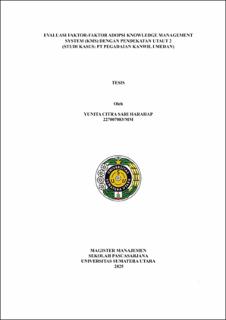Evaluasi Faktor-Faktor Adopsi Knowledge Management System (KMS) Dengan Pendekatan UTAUT 2 (Studi Kasus: PT Pegadaian Kanwil I Medan)
Evaluation of Knowledge Management System (KMS) Adoption Factors with UTAUT 2 Approach (Case Study: PT Pegadaian Kanwil I Medan)

Date
2025Author
Harahap, Yunita Citra Sari
Advisor(s)
Lumbanraja, Prihatin
Matondang, Abdul Rahim
Metadata
Show full item recordAbstract
Technology has become an essential tool that supports various aspects of human life, including in the business sector and organizations. In the era of knowledge-based economy, Knowledge Management (KM) is the main strategy to support organizational learning, improve performance, and generate innovation. PT Pegadaian, as a large company in the pawn services sector, has implemented a knowledge management system called iLeads to improve the learning culture and competency of employees. However, research shows that the use of iLeads, especially the self-learning feature, is still suboptimal. This study aims to analyze the factors that affect the acceptance of KMS iLeads technology using the Unified Theory of Acceptance and Use of Technology 2 (UTAUT2) approach. The sample in this study is all employees of PT Pegadaian Regional Office I Medan totaling 61 people. The sampling technique uses the census technique because the population is relatively small, so the entire population can be used as respondents. The method of this research is descriptive statistical analysis. Data was collected using questionnaires. Data analysis in this study uses Partial Least Square – Structural Equation Modeling (PLS-SEM) with SMARTPLS4. The results of this study are: In direct effect (1) Performance expectancy, (2) Effort expectancy, (3) Social influence, and (4) Facilitating conditions have a significant positive influence on behavioral intention; (5) Habit has a significant positive effect on behavioral intention and use behavior; and (6) Behavioral intention has a significant positive effect on use behavior. In indirect effect, (7) performance expectancy, (8) effort expectancy, (9) social influence, and (10) facilitating conditions have a significant positive influence on use behavior through behavioral intention. (11) Habit has a significant positive influence on use behavior through behavioral intention.
